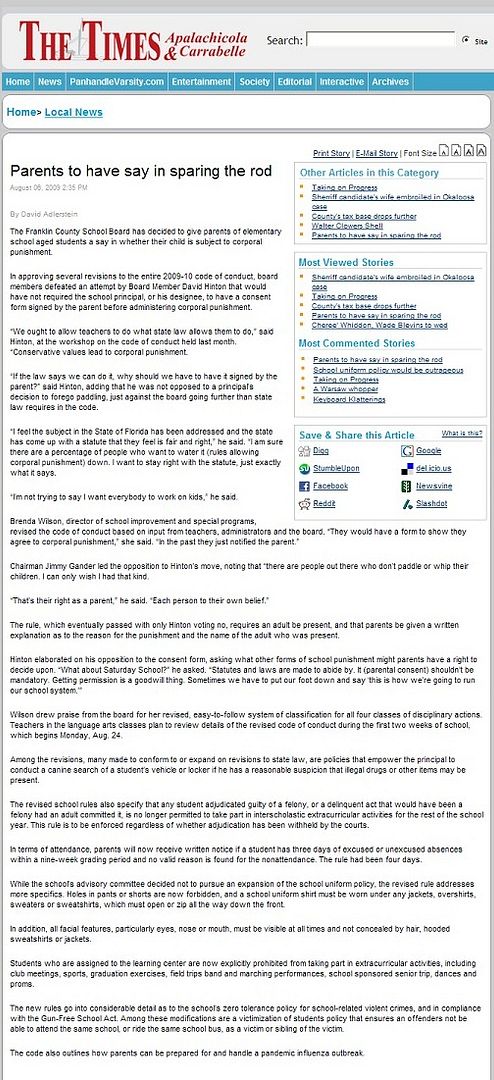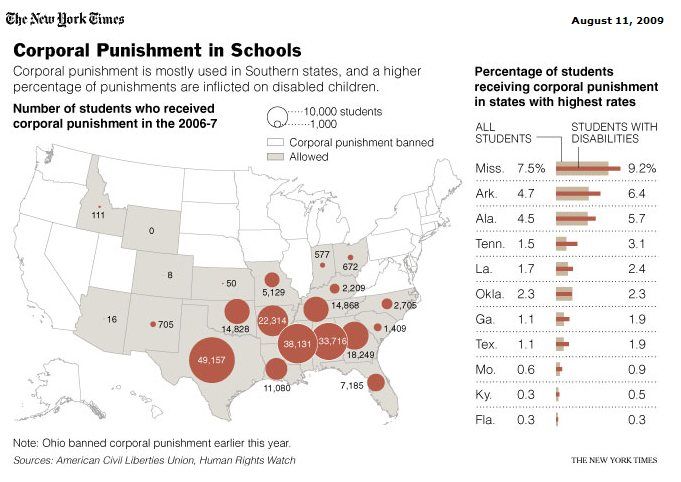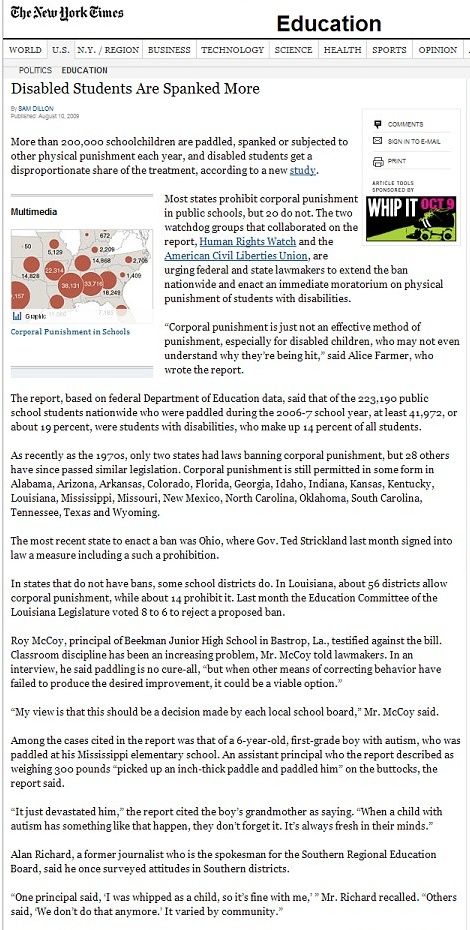Appalachian Times, Apalachicola, Florida, 6 August 2009
Parents to have say in sparing the rod
By David Adlerstein
(extract)
The Franklin County School Board has decided to give parents of elementary school aged students a say in whether their child is subject to corporal punishment.
In approving several revisions to the entire 2009-10 code of conduct, board members defeated an attempt by Board Member David Hinton that would have not required the school principal, or his designee, to have a consent form signed by the parent before administering corporal punishment.
"We ought to allow teachers to do what state law allows them to do," said Hinton, at the workshop on the code of conduct held last month. "Conservative values lead to corporal punishment.
"If the law says we can do it, why should we have to have it signed by the parent?" said Hinton, adding that he was not opposed to a principal's decision to forego paddling, just against the board going further than state law requires in the code.
"I feel the subject in the State of Florida has been addressed and the state has come up with a statute that they feel is fair and right," he said. "I am sure there are a percentage of people who want to water it (rules allowing corporal punishment) down. I want to stay right with the statute, just exactly what it says.
"I'm not trying to say I want everybody to work on kids," he said.
Brenda Wilson, director of school improvement and special programs, revised the code of conduct based on input from teachers, administrators and the board. "They would have a form to show they agree to corporal punishment," she said. "In the past they just notified the parent."
Chairman Jimmy Gander led the opposition to Hinton's move, noting that "there are people out there who don't paddle or whip their children. I can only wish I had that kind.
"That's their right as a parent," he said. "Each person to their own belief."
The rule, which eventually passed with only Hinton voting no, requires an adult be present, and that parents be given a written explanation as to the reason for the punishment and the name of the adult who was present.
Hinton elaborated on his opposition to the consent form, asking what other forms of school punishment might parents have a right to decide upon. "What about Saturday School?" he asked. "Statutes and laws are made to abide by. It (parental consent) shouldn't be mandatory. Getting permission is a goodwill thing. Sometimes we have to put our foot down and say 'this is how we're going to run our school system.'"
Wilson drew praise from the board for her revised, easy-to-follow system of classification for all four classes of disciplinary actions. Teachers in the language arts classes plan to review details of the revised code of conduct during the first two weeks of school, which begins Monday, Aug. 24.
[...]
The New York Times, 11 August 2009
Disabled Students Are Spanked More
By Sam Dillon
More than 200,000 schoolchildren are paddled, spanked or subjected to other physical punishment each year, and disabled students get a disproportionate share of the treatment, according to a new study.
Most states prohibit corporal punishment in public schools, but 20 do not. The two watchdog groups that collaborated on the report, Human Rights Watch and the American Civil Liberties Union, are urging federal and state lawmakers to extend the ban nationwide and enact an immediate moratorium on physical punishment of students with disabilities.
"Corporal punishment is just not an effective method of punishment, especially for disabled children, who may not even understand why they're being hit," said Alice Farmer, who wrote the report.
The report, based on federal Department of Education data, said that of the 223,190 public school students nationwide who were paddled during the 2006-7 school year, at least 41,972, or about 19 percent, were students with disabilities, who make up 14 percent of all students.
As recently as the 1970s, only two states had laws banning corporal punishment, but 28 others have since passed similar legislation. Corporal punishment is still permitted in some form in Alabama, Arizona, Arkansas, Colorado, Florida, Georgia, Idaho, Indiana, Kansas, Kentucky, Louisiana, Mississippi, Missouri, New Mexico, North Carolina, Oklahoma, South Carolina, Tennessee, Texas and Wyoming.
The most recent state to enact a ban was Ohio, where Gov. Ted Strickland last month signed into law a measure including a such a prohibition.
In states that do not have bans, some school districts do. In Louisiana, about 56 districts allow corporal punishment, while about 14 prohibit it. Last month the Education Committee of the Louisiana Legislature voted 8 to 6 to reject a proposed ban.
Roy McCoy, principal of Beekman Junior High School in Bastrop, La., testified against the bill. Classroom discipline has been an increasing problem, Mr. McCoy told lawmakers. In an interview, he said paddling is no cure-all, "but when other means of correcting behavior have failed to produce the desired improvement, it could be a viable option."
"My view is that this should be a decision made by each local school board," Mr. McCoy said.
Among the cases cited in the report was that of a 6-year-old, first-grade boy with autism, who was paddled at his Mississippi elementary school. An assistant principal who the report described as weighing 300 pounds "picked up an inch-thick paddle and paddled him" on the buttocks, the report said.
"It just devastated him," the report cited the boy's grandmother as saying. "When a child with autism has something like that happen, they don't forget it. It's always fresh in their minds."
Alan Richard, a former journalist who is the spokesman for the Southern Regional Education Board, said he once surveyed attitudes in Southern districts.
"One principal said, 'I was whipped as a child, so it's fine with me,'" Mr. Richard recalled. "Others said, 'We don't do that anymore.' It varied by community."
Time, New York, 12 August 2009
Corporal Punishment in U.S. Schools
By M.J. Stephey
Impairing Education
American Civil Liberties Union and Human Rights Watch
Aug. 11, 2009
62 pages
The Gist:
It seems like a scene from Oliver Twist -- a young pupil being beaten by a 300-lb man wielding an inch-thick wooden paddle -- but according to a new report by Human Rights Watch and the American Civil Liberties Union, nearly a quarter of a million children were subjected to corporal punishment in public schools in the U.S. during the 2006-2007 academic year. Based on 202 interviews with parents, students, teachers and administrators, and supplemented with data from the U.S. Department of Education, the report reveals how the spare-the-rod-spoil-the-child philosophy continues to rule thousands of classrooms across America, and how students with disabilities are disproportionately affected by such draconian methods of discipline.
Highlight Reel:
1. What "corporal punishment" means: "Corporal punishment is defined under human-rights law as "any punishment in which physical force is used and intended to cause some degree of pain or discomfort." There is no comprehensive definition of corporal punishment under U.S. state or federal law. The ACLU and Human Rights Watch documented cases of corporal punishment including hitting children with a belt, a ruler, a set of rulers taped together or a toy hammer; pinching, slapping or striking very young children in particular; grabbing children around the arm, the neck or elsewhere with enough force to bruise; throwing children to the floor; slamming a child into a wall; dragging children across floors; and bruising or otherwise injuring children in the course of restraint."
2. On its widespread use in classrooms, especially in punishing disabled students: "Corporal punishment is legal under domestic law in 20 states ... Texas paddles the most students in the nation, as well as the most students with disabilities ... The total number of students, with and without disabilities, who were subjected to corporal punishment in the 2006-2007 school year was 223,190. ... Nationwide, students with disabilities receive corporal punishment at disproportionately high rates. In Tennessee, for example, students with disabilities are paddled at more than twice the rate of the general student population. ... Students with autism are particularly likely to be punished for behaviors common to their condition, stemming from difficulties with appropriate social behavior. ... Anna M., whose son with autism was physically punished repeatedly when he was seven years old, noted, "The teacher felt he was doing some stuff on purpose. If you met him, you wouldn't know he was autistic straight away. People thought we were making an excuse for him.'"
3. On why corporal punishment is still condoned: "Educators, who face the difficult task of maintaining order in the classroom, may resort to corporal punishment because it is quick to administer, or because the school lacks resources and training for alternative methods of discipline. One teacher pointed out that corporal punishment can be considered 'cost-effective. It's free, basically. You don't have to be organized. All you need is a paddle.' Logistical or financial obstacles may prevent teachers from using other methods of discipline. One 18-year-old student who was critical of the use of corporal punishment in his rural school district stated that 'we couldn't have after school detention. There was no busing. Kids who got detention would have to find another way home.'"
4. On the aftermath: "The Society for Adolescent Medicine has documented serious medical consequences resulting from corporal punishment, including severe muscle injury, extensive blood-clotting (hematomas), whiplash damage and hemorrhaging. ... Corporal punishment led to deterioration in family life, as parents were forced to withdraw children from school, resort to homeschooling and give up jobs. ... Rose C.'s son was unable to tell her that he was repeatedly punished in school, but she learned of some of the abuse after watching a security video. She said, 'I don't trust my own eyes anymore.'"
The Lowdown:
As the report notes, corporal punishment is banned in most juvenile correction facilities in the U.S., and yet it continues in public schools. The legal paradox can be traced to a 1977 Supreme Court ruling that found the Eighth Amendment only protects convicted criminals from cruel and unusual punishment — not students confined to a classroom. In its plea to convince federal and state lawmakers to impose a national ban on the practice, the authors point out yet another paradox, using the words of a special-ed teacher in Mississippi: "I see these children who get in fights and then get paddled. So you're supposed to teach them not to hit by hitting them?"
waff.com (WAFF 48 News), Huntsville, Alabama, 13 August 2009
Corporal punishment good or bad in Alabama?
By Jeanie Powell
HUNTSVILLE, AL (WAFF)- Alabama tops another list, and opinions vary on whether it's a good or bad thing.
A study suggests corporal punishment is high in Alabama and disproportionate among kids with disabilities.
We found corporal punishment is included in many Valley school system policies, but we're told it's not heavily implemented in many.
Administrators try and go a different route, even though, it is approved at the top from the state level.
So is corporal punishment outdated or good discipline?
Huntsville mother of three Stacy Shafer said, "I really believe that should be the parents' job."
Huntsville grandmother Pam Nelson told WAFF 48 News, "I don't believe that a teacher should be allowed to spank."
Huntsville father James Bartlett said, "As long as it's used in a way that's not overly aggressive. I had it when I was a kid. It wouldn't be a bad thing, but I don't think it's the first choice, but I think it's a choice if other measures aren't working out."
Human Rights Watch released a report ranking Alabama third among states with the highest rates of corporal punishment.
The data was collected from the 2006-07 school year.
It narrows its focus to who is punished, suggesting "students with disabilities are punished at disproportionately high rates in almost every state that uses paddling heavily."
In Alabama, nearly 34,000 students got paddled in 2006-2007.
More than 5,000 of them had disabilities.
Multiple Valley superintendents we spoke to said the report is contradictory to their school system.
Madison County School Superintendent Dr. Terry Davis said, "I don't think that would be valid here."
Davis called corporal punishment a last resort and said it's up to the principals to enforce it.
Davis told WAFF 48 News, "Our policy, which I think is good, ensures that we do use tact, it has to be done in an isolated area, usually administrative office, has to be done with a witness, certified employee."
In Madison County, parents and guardians don't have to give their school system consent to paddle their child, however administrators try to inform the parents and guardians before they take that course of action.
Davis said several of his parents are in favor of this type of reprimand.
Davis said, "I don't really see it going away, because I really don't think it's abused in our area. I think it's just an option."
Huntsville City Schools, which also has corporal punishment within its policy, said special ed children fall under different policies.
A representative explains the method isn't used often.
Decatur superintendent Dr. Sam Houston told WAFF 48 News while paddling is incorporated in his school system, administrators try and provide a range of options instead of resorting to corporal punishment.
© 2009 WAFF. All rights reserved.
RELATED VIDEO CLIP
TV report (2 minutes 18 seconds) from WAFF48 News (Huntsville AL) (NBC), 13 August 2009, of which the above is a text version.
HERE IS THE CLIP:
This video clip is not currently available.
IMPORTANT: Copyright in this video material rests with the original copyright holders. This brief excerpt is reproduced under the "fair use" doctrine
for private, non-profit, historical research and education purposes only. It must not be redistributed or republished in any commercial context.
The Arizona Republic, Phoenix, 27 August 2009
Arizona should ban paddling of schoolkids, panel suggests
At least 32 districts allow corporal punishment
By Emily Gersema
The Arizona Republic
Arizona should forbid corporal punishment in schools, a state education task force has recommended.
All nine members of the task force assembled this summer agreed on the ban, said panel Chairman Michael Remus, Deer Valley Unified School District's special-education director.
"The reason for this is that it is punitive and does not redirect the (student's) behavior to something more positive," Remus said. "The student does not learn the appropriate behavior through this method of punishment."
Remus added that the federal Individuals with Disabilities Education Act urges school staff to manage bad behaviors through positive techniques that inspire student to act respectfully and appropriately in class.
Arizona is among 20 states that allow school districts to mete out corporal punishment, usually paddling, to control children.
The other states are mainly in the South and Southeast, from Texas to Florida.
In Arizona, corporal punishment is permitted by the governing boards of at least 32 school districts, according to data kept by the Arizona School Boards Association, which helps boards write policies.
Those represent about 15 percent of 214 districts that belong to the association. The other 182 forbid corporal punishment.
"It's important to point out that districts may have a policy to allow it, but they may not actually practice it," said Tracey Benson, an ASBA spokeswoman.
Under a state law that created the task force, school districts must accept or reject the recommendation to forbid corporal punishment by June 30.
Apache Junction Unified School District is one of the districts that now allow it.
District spokeswoman Carol Shepherd said corporal punishment is part of Apache Junction's school policies, "but we haven't practiced it since I don't know when."
George Huggins, a task-force member, is an assistant superintendent of Bullhead City Elementary School District, whose board policies allow corporal punishment carried out by the superintendent.
Huggins said he can't recall the district using corporal punishment.
Andrew Morrill, vice president of the Arizona Education Association, was surprised the state still allows corporal punishment.
"Hasn't that already been banned?" he asked.
Morrill added that most teachers use methods to manage students, such as incentives "that actually result in positive behavior."
The frequency of corporal punishment in Arizona is difficult to gauge; schools aren't required to report it to any state or federal agency or auditor.
However, the U.S. Department of Education's Office for Civil Rights conducts a survey of programs and practices every few years, calling upon districts to volunteer the information.
The agency found 13 students were paddled in Arizona in 2006, according to its most recent survey.
The international group Human Rights Watch has issued two reports in the past year examining the agency's data and comparing state counts.
A lead researcher on both reports, Alice Farmer, said Arizona's corporal-punishment rate is small, especially compared with other states such as Texas, where more than 49,000 students were punished with paddling in 2006, or Mississippi, which reported 38,000 students were paddled.
Farmer said the human-rights organization believes the numbers underrepresent the true scope of how often and how many children receive corporal punishment.
The Office for Civil Rights reports the number of students who receive corporal punishment per year, she said, but "if a student receives 10 incidents of corporal punishment in a year, that is only listed as one time."
Through interviews with students, Human Rights Watch found several students were paddled or swatted multiple times during the school year.
This punishment often only made the students angrier and more likely to misbehave, Farmer said.
Even if a district doesn't use corporal punishment anymore, Farmer said, the outdated policy needs to be ended.
"It's best to make sure it's not on the books at all because you don't want to go back to it," she said.
The Arizona task force was formed largely to change how districts deal with special-education students. It cannot ban corporal punishment statewide. Under the legislation that created the task force, Senate Bill 1197, the panel can only recommend, not mandate, best practices for schools to handle misbehaving students.
Parents of special-needs kids who advocated the bill have said they hope the recommendation will lead to tougher legislation with sanctions for districts that refuse to comply.
Human Rights Watch has called for a congressional ban, and Farmer believes every level of government, including state and local governing boards, should take similar action.
U.S. Education Secretary Arne Duncan is a proponent of local control, leaving policy decisions up to local governing boards.
"The secretary respects the authority of legislators in the 20 states that allow corporal punishment in schools, as this is a state decision," a spokesman said, "but he is not supportive of corporal punishment."
Arizona Superintendent of Public Instruction Tom Horne said: "I've always felt corporal punishment is inappropriate in schools. Only parents should be able to do that."
The recommendation will be published on the Arizona Department of Education Web site sometime this week.
Corporal punishment in Arizona schools
An informal list provided by the Arizona Association of School Boards to the state Department of Education showed 34 districts had policies allowing it. A Republic check of governing board policies published online showed that Liberty Elementary and Tucson Unified school districts have banned it, leaving 32:
-- Apache Junction Unified School District.
-- Arlington Elementary District.
-- Blue Ridge Unified School District.
-- Bouse Elementary District.
-- Bullhead City Elementary District.
-- Duncan Unified School District.
-- Elfrida Elementary District.
-- Fort Thomas Unified School District.
-- Globe Unified School District.
-- Hayden-Winkelman Elementary District.
-- Heber-Overgaard Unified District.
-- Hyder Elementary District.
-- Laveen Elementary District.
-- Littlefield Unified District.
-- Mammoth-San Manuel Unified District.
-- Maricopa Unified School District.
-- Mohave Valley Elementary District.
-- Nadaburg Unified School District.
-- Owens-Whitney Elementary District.
-- Palo Verde Elementary District.
-- Parker Unified School District.
-- Peach Springs Unified District.
-- Pearce Elementary District.
-- Pima Unified District.
-- Riverside Elementary District.
-- Round Valley Unified District.
-- Safford Unified District.
-- Thatcher Unified District.
-- Wellton Elementary District.
-- Willcox Unified District.
-- Wilson Elementary District.
-- Winslow Unified District.Copyright © 2009, azcentral.com. All rights reserved.
BainbridgeGA.com (Bainbridge News, Georgia), 28 August 2009
BOE: Corporal Punishment Back?
The Decatur County Board of Education met in a Thursday night work session to discuss a number of issues. One issue was a formal policy change to prohibit corporal punishment in the schools.
After a February of 2009 controversial spanking of a 9 year old 3 times in one day, where an assistant principal was suspended, Superintendent Ralph Jones initiated a policy of no corporal punishment in Decatur County Schools.Superintendent Jones has now brought the issue to the Board of Education to make a final decision.
At last week's dinner meeting, a formal policy change to prohibit corporal punishment was presented to the Board. A short discussion followed and it appeared the majority of the Board was in agreement with the prohibition.
On Thursday evening, Hutto Middle School Principal Steven Dupree convincingly supported maintaining corporal punishment and, if he did not change their minds completely, he certainly put them on the fence.
Mr Dupree stated "When you take corporal punishment away from the consequences of behavior, you're not only limiting choices from the school administration's standpoint, but you are also limiting the choices for parents." He described that the 5th step in the discipline process is an office referral. At that point, Mr Dupree stated, he calls the student's parent, who has previously been made aware of the discipline problem by a teacher.
The only options now are In School Suspension (ISS) or Out of School Suspension (OSS), Mr Dupree explained, but either way, that child is now not in the classroom. He stated that, the vast majority of times, when he offers the child's parent an option of licks or ISS, they tell him "You go ahead and take care of the licks, I want him in the classroom and I'll see him when he gets home."
Mr Dupree stated that despite the unfortunate incident last year, the policy of corporal punishment has always worked for Decatur County Schools. "If we do away with it, it's difficult to come back to it." He stressed that a change would take the option away from parents.
© Copyright by BainbridgeGA.com
About this website
Search this site
Article: American school paddling
Other external links: US school CP
Archive 2009: USA
Video clips
Picture index
Previous month
Following month








